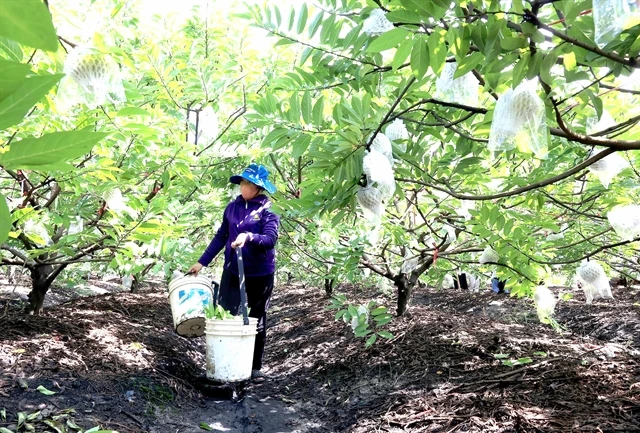Tây Ninh Province is taking measures to help its farmers adopt technology.
TÂY NINH — The southeastern province of Tây Ninh is taking measures to help its farmers adopt technology.
The locality plans to develop 22 high-tech agricultural zones spread over 15,000-20,000ha each between next year and 2030, according to its Department of Agriculture and Rural Development.
Nguyễn Đình Xuân, its director, said the zones would grow vegetables and fruits in “concentrated and specialised farming areas”.
The province targets high-tech agriculture accounting for 50 per cent of produce value and yielding VNĐ180 million (US$7,000) worth of output per hectare per year by 2030, he said.
With its large tracts of farmlands, abundant water from the Sài Gòn and Vàm Cỏ Đông rivers and Dầu Tiếng Reservoir, the country’s largest for irrigation, the province has ideal conditions for developing high-tech agriculture.
It has support policies to assist farming, encourage companies to invest in agriculture and support the development of small irrigation works and efficient irrigation and seed production.
It also provides soft loans to farmers to implement good agricultural practices and high-tech agriculture, and helps them link up with other stakeholders in the supply chain to sell their produce.
Lê Thị Mai Huyền, Vice Chairwoman of the Tây Ninh Business Association, said the province has many policies to help farmers adopt technology, but since they are not coordinated, the area under high-tech farming is not large.
The linkages between companies and farmers are not close, and production costs are high as a result, which makes farmers reluctant to change their production methods, she added.
According to the department, the linkages remain modest because farmers lack the habit of linking with companies, and the capacity of companies and co-operatives with whom they could potentially link is still limited.
Nguyễn Ngọc Ánh, Vice Chairwoman of the Tây Ninh Farmers Association, said links between stakeholders in high-tech agriculture offer benefits to farmers, who are important stakeholders.
Farmers should participate in co-operatives and co-operative groups to achieve effective linkages, and authorities would offer support for seeds and other inputs, she said.
Participating farmers would be instructed in advanced farming techniques to grow produce that meet market requirements, she added.
The department said only 14.5 per cent of agricultural output benefits from such linkages.
The province has developed linkages for key products such as pig, chicken, cattle, sugarcane, custard apple, banana, rice, and durian, it said.
The province plans to strengthen advocacy about the linkages and the benefits of creating them, it said.
More and more farmers in the province have adopted advanced techniques in recent years to improve their efficiency.
They have applied automatic irrigation for polygreen and net houses to grow vegetables and honeydew melon on 35ha and 20ha.
The province has 1,503ha under grapefruit, banana, custard apple, mango, longan, jujube, avocado, and other fruits with origin traceability.
It has granted production codes for 100 fruit growing areas to export to the EU, the US, Australia, New Zealand, and China.
It has attracted investments in large agricultural projects in recent years, including 146 animal breeding projects that are operational.
Its agricultural sector has been growing at 3 - 3.4 per cent a year in recent years and accounts for 20 per cent of its economy. — VNS



